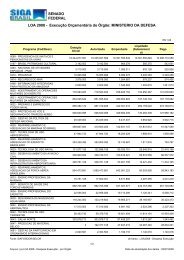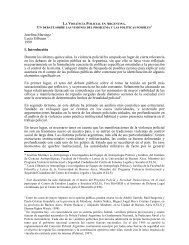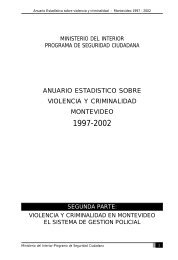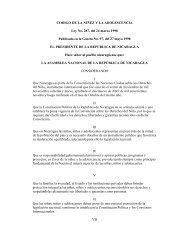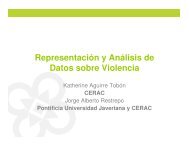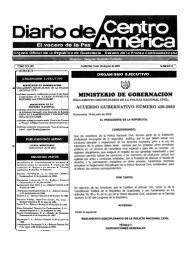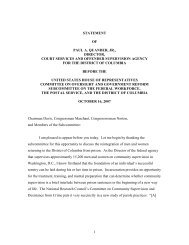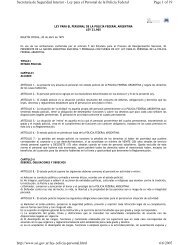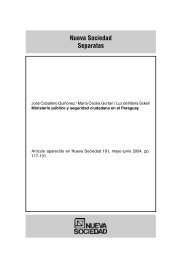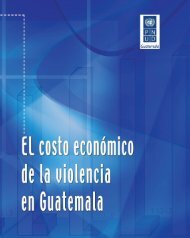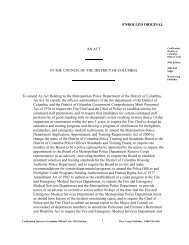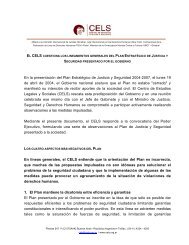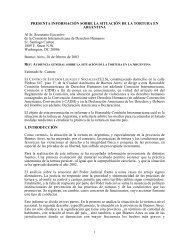Venezuela: The Life and Times of the Party System - Political ...
Venezuela: The Life and Times of the Party System - Political ...
Venezuela: The Life and Times of the Party System - Political ...
Create successful ePaper yourself
Turn your PDF publications into a flip-book with our unique Google optimized e-Paper software.
elaboration <strong>of</strong> c<strong>and</strong>idate lists for councilors <strong>and</strong> mayors has led to confrontations (some very<br />
severe) between national <strong>and</strong> local leaders within <strong>the</strong> parties.<br />
Direct elections for state governors are ano<strong>the</strong>r recent <strong>and</strong> important innovation in <strong>the</strong><br />
electoral system. 1 Prior to 1989, governors were appointed <strong>of</strong>ficials serving at <strong>the</strong> pleasure <strong>of</strong><br />
<strong>the</strong> President <strong>of</strong> <strong>the</strong> Republic. As in <strong>the</strong> case <strong>of</strong> municipal elections, direct gubernatorial elections<br />
have opened new space for political participation on <strong>the</strong> part <strong>of</strong> previously uninvolved citizens <strong>and</strong><br />
groups, narrowing <strong>the</strong> distance between voters <strong>and</strong> elected <strong>of</strong>ficials <strong>and</strong> reinforcing <strong>the</strong> tendency<br />
to decentralize power. <strong>The</strong> results <strong>of</strong> <strong>the</strong> first gubernatorial elections were mixed. Relatively high<br />
abstention rates in <strong>the</strong>se elections suggests that <strong>the</strong>y did not trigger <strong>the</strong> degree <strong>of</strong> ‘civic<br />
enthusiasm’ hoped for. 2 Still <strong>the</strong>y did succeed in personalizing <strong>and</strong> localizing elections, this time<br />
at an even more important politico-administrative level. <strong>The</strong>y also opened spaces for smaller<br />
parties <strong>and</strong> allowed experimentation with new forms <strong>of</strong> opposition.<br />
Despite <strong>the</strong>se multiple reforms, <strong>the</strong> party dominance <strong>of</strong> AD <strong>and</strong> COPEI remains apparent.<br />
In <strong>the</strong> December 1989 elections, <strong>of</strong> a possible 20 state governorships, AD won 11, COPEI 6, <strong>and</strong><br />
MAS <strong>and</strong> Causa R one each. Under <strong>the</strong> former electoral formula, all twenty governors would<br />
have gone to AD. In any case, AD’s apparent success is somewhat deceptive; <strong>the</strong> party lost in<br />
<strong>the</strong> most populous states with Aragua, Carabobo, Bolívar, Merida, Mir<strong>and</strong>a, <strong>and</strong> Zulia all going to<br />
<strong>the</strong> opposition (Table 9). Fur<strong>the</strong>rmore, several governors’ races saw <strong>the</strong> formation <strong>of</strong> coalitions<br />
<strong>and</strong> alliances among opposition groups which in some cases proved crucial to <strong>the</strong> victory <strong>of</strong><br />
certain c<strong>and</strong>idates. 3<br />
Direct elections for mayors were also introduced in 1989, along with ‘preference voting’<br />
for municipal councilors. Under this system, voters may ei<strong>the</strong>r vote for <strong>the</strong> entire list proposed by<br />
a party, or choose <strong>the</strong>ir preferred c<strong>and</strong>idates by name from among all registered c<strong>and</strong>idates even<br />
when <strong>the</strong>ir names appear on separate party lists. 4 According to one <strong>of</strong> its founders, <strong>the</strong> purpose<br />
1 <strong>The</strong> method for choosing state governors sparked bitter debate in <strong>the</strong> Constitutional<br />
Assembly <strong>of</strong> 1946-47. During debates that led to <strong>the</strong> Constitution <strong>of</strong> 1961, a similar confrontation<br />
was avoided by adopting <strong>the</strong> ‘temporary’ solution (which lasted nearly thirty years) <strong>of</strong> presidential<br />
designation <strong>of</strong> governors until <strong>the</strong> matter could be resolved definitively. See Kornblith (1991).<br />
2 Orl<strong>and</strong>o Contreras Pulido, director <strong>of</strong> municipal affairs for COPEI, predicted that direct<br />
popular election <strong>of</strong> governors, mayors, <strong>and</strong> municipal councilors “will generate civic enthusiasm in<br />
a population wearied by <strong>the</strong> formal <strong>and</strong> routinized practice <strong>of</strong> democracy. [<strong>The</strong>y will give] a<br />
second wind to a system which 31 years after its founding has fallen into elitism, <strong>and</strong> is <strong>the</strong>refore<br />
distant from <strong>the</strong> people <strong>and</strong> absolutely disoriented in regard to its purposes” (Contreras Pulido<br />
1989, 56-57, italics added).<br />
3 For example, in <strong>the</strong> state <strong>of</strong> Carabobo, <strong>the</strong> COPEI c<strong>and</strong>idate won with 46.6 percent <strong>of</strong> <strong>the</strong><br />
vote. Of this total, 31.3 percent came from COPEI supporters, 11.4 percent from MAS voters,<br />
<strong>and</strong> <strong>the</strong> rest from votes cast for smaller groups <strong>and</strong> factions. <strong>The</strong> AD c<strong>and</strong>idate won 45 percent<br />
<strong>of</strong> <strong>the</strong> total vote.<br />
4 <strong>The</strong>se innovations were established by <strong>the</strong> reform <strong>of</strong> <strong>the</strong> Ley Orgánica del Régimen<br />
Municipal in 1988 <strong>and</strong> by <strong>the</strong> partial modification <strong>of</strong> <strong>the</strong> Ley Orgánica del Sufragio in 1989.<br />
According to law, each voter may vote for as many names as equal <strong>the</strong> total number <strong>of</strong><br />
c<strong>and</strong>idates to be elected in <strong>the</strong> municipality [Ley Orgánica del Sufragio, article 161].



